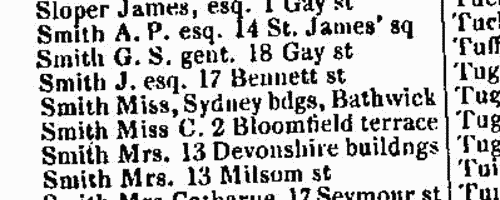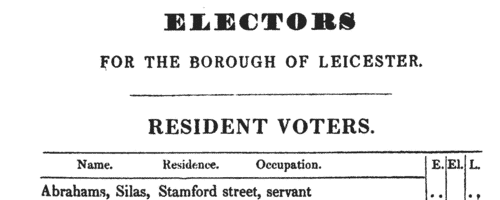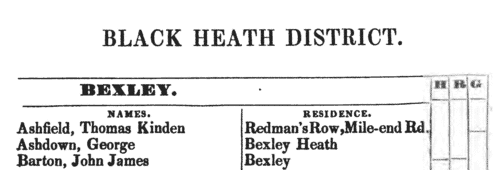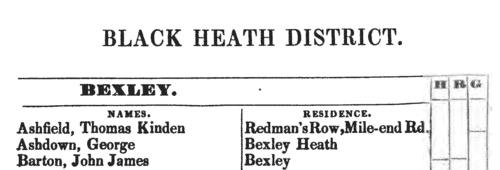Our indexes include entries for the spelling dear. In the period you have requested, we have the following 349 records (displaying 101 to 110):
Bankrupts' Assignees
(1829)
Assignees of bankrupts' estates (usually principal creditors and/or close relatives of the bankrupt) | Sample scan, click to enlarge

|
Inhabitants of Dorset
(1830)
Pigot & Co.'s National Commercial Directory lists traders, farmers and private residents in the county. | Sample scan, click to enlarge

|
Inhabitants of Somerset
(1830)
Pigot & Co.'s National Commercial Directory lists traders, farmers and private residents in the county. | Sample scan, click to enlarge

|
Leicester Poll Book: Resident Voters
(1832)
A poll was taken on 12 and 13 December 1832 for the election of two representatives in Parliament for the borough of Leicester, the candidates being William Evans esquire (E.), Wynn Ellis esquire (El.) and J. W. Boughton Leigh esquire (L.). This poll book, printed by J. G. Brown of Leicester, gives the name, residence and occupation of all the electors, divided into four categories: resident voters, non-resident voters, resident non-voters, and non-resident non-voters. For those who polled, their votes are marked on the right hand side. Under the 1832 Reform Act the franchise within the borough had been extended to all (adult male) owners or tenants of property worth £10 a year or more. | Sample scan, click to enlarge

|
Electors in Headcorn
(1835)
A poll to elect knights of the shire to represent the Western Division of the county of Kent in parliament was held in 1835, the candidates being Thomas Law Hodges (H), Thomas Rider (R) and sir William R. P. Geary (G). The poll started on January 19th; Rider withdrawing his name on that first day, the poll was closed prematurely, many electors not yet having voted. This poll book lists all the electors, whether they voted or not; the county franchise included not only male freeholders of 40s a year, but also £10 copyholders and long-leaseholders, and £50 short-leaseholders and tenants. For each elector the full name is given (surname first) and residence (often not the place for which qualified to vote). Votes are indicated by dashes in the right-hand columns. | Sample scan, click to enlarge

|
Electors in Maidstone
(1835)
A poll to elect knights of the shire to represent the Western Division of the county of Kent in parliament was held in 1835, the candidates being Thomas Law Hodges (H), Thomas Rider (R) and sir William R. P. Geary (G). The poll started on January 19th; Rider withdrawing his name on that first day, the poll was closed prematurely, many electors not yet having voted. This poll book lists all the electors, whether they voted or not; the county franchise included not only male freeholders of 40s a year, but also £10 copyholders and long-leaseholders, and £50 short-leaseholders and tenants. For each elector the full name is given (surname first) and residence (often not the place for which qualified to vote). Votes are indicated by dashes in the right-hand columns. | Sample scan, click to enlarge

|
Unclaimed Dividends
(1835)
Names of creditors yet to claim dividends from bankrupts' estates | Sample scan, click to enlarge

|
Staffordshire Inquests
(1836)
The accounts of expenses incurred by Henry Smith of Wolverhampton, Staffordshire coroner, list the full names of the deceased, the date and place of each inquest. January to December 1836 | Sample scan, click to enlarge

|
Insolvents
(1837)
Insolvency notices for England and Wales: insolvency often caused people to restart their lives elsewhere, so these are an important source for lost links | Sample scan, click to enlarge

|
Petitioning Creditors and Solicitors
(1838)
Principal creditors petitioning to force a bankruptcy (but often close relatives of the bankrupt helping to protect his assets): and solicitors | Sample scan, click to enlarge

|
Research your ancestry, family history, genealogy and one-name study by direct access to original records and archives indexed by surname.











